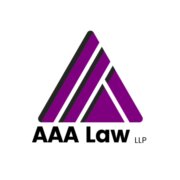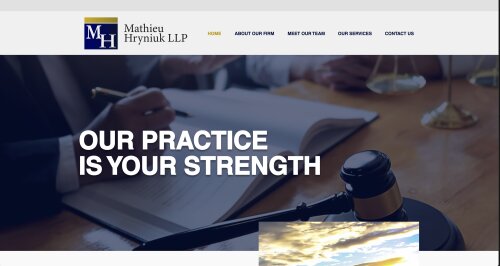Best Corporate Governance Lawyers in Toronto
Share your needs with us, get contacted by law firms.
Free. Takes 2 min.
List of the best lawyers in Toronto, Canada
About Corporate Governance Law in Toronto, Canada
Corporate governance refers to the system of rules, practices, and processes by which companies are directed and controlled. In Toronto, Canada, corporate governance laws aim to ensure that companies operate transparently, ethically, and in compliance with legal standards. These laws help safeguard the interests of shareholders, stakeholders, directors, and officers by establishing accountability, promoting fair decision-making, and minimizing risks related to corporate structures and activities.
Why You May Need a Lawyer
Legal expertise in corporate governance can be crucial for both new and established businesses. Common situations where you may require the assistance of a lawyer include:
- Establishing or updating corporate bylaws and governance policies
- Advising directors and officers on their legal duties and responsibilities
- Ensuring compliance with federal and Ontario securities regulations
- Dealing with shareholder disputes or conflicts of interest
- Managing mergers, acquisitions, or restructurings
- Responding to regulatory investigations or enforcement actions
- Assisting with annual meetings, disclosures, and reporting requirements
A lawyer can help you navigate complex regulations, avoid costly non-compliance, and protect your company’s reputation and operations.
Local Laws Overview
Toronto businesses are governed by a combination of federal and provincial laws. Key regulations and frameworks include:
- The Canada Business Corporations Act (CBCA) for federally incorporated companies
- The Ontario Business Corporations Act (OBCA) for provincially incorporated entities
- Ontario Securities Act and related securities regulations
- Toronto Stock Exchange (TSX) rules, if publicly listed
- Common law fiduciary duties for directors and officers, including acting in good faith and in the best interests of the company
- Requirements for annual shareholder meetings and accurate financial reporting
Corporate governance in Toronto emphasizes transparency, accountability, proper disclosure, conflict resolution, and responsible stewardship of the corporation. Companies must adhere to specific standards regarding board composition, independent directors, committees, and internal controls.
Frequently Asked Questions
What is the role of the board of directors in corporate governance?
The board of directors oversees a company’s management, sets strategic direction, ensures legal compliance, monitors financial performance, and represents the interests of shareholders and stakeholders.
Are there specific rules for private and public companies?
Yes. Public companies are subject to additional disclosure, governance, and reporting requirements, especially if listed on the TSX. Private companies have more flexibility but must still comply with relevant corporate statutes.
What are the fiduciary duties of directors and officers?
Directors and officers must act honestly, in good faith, and in the best interests of the corporation. They must avoid conflicts of interest and exercise care, diligence, and skill in their decisions.
How often must a Toronto corporation hold shareholders' meetings?
Corporations are typically required to hold an annual general meeting to present financial statements, elect directors, and address other important business matters.
What are common corporate governance issues in Toronto?
Common issues include conflicts of interest, shareholder disputes, lack of transparency, improper record-keeping, and inadequate risk management practices.
Is it mandatory to have independent directors in Toronto corporations?
For publicly traded companies, independent directors are generally required on boards and committees. Private companies may not be legally required but may choose to appoint independents to promote good governance.
What is the role of a corporate secretary?
The corporate secretary assists the board with compliance, record-keeping, meeting coordination, and filing required documents with regulatory bodies.
How can I resolve a shareholder dispute?
Disputes can often be resolved through negotiation, mediation, or arbitration. In more serious cases, legal action in court may be necessary. Strong corporate governance frameworks can help prevent these disputes from arising.
What disclosures are required under Canadian corporate law?
Companies must provide accurate financial statements, management reports, and information about material changes, especially if they are public companies.
How can a lawyer help if my company faces a regulatory investigation?
A lawyer can guide you through the investigation, protect your rights, represent you in dealings with regulators, and help you implement remedial policies if necessary.
Additional Resources
If you need further information or support, the following organizations and governmental bodies can be helpful:
- Ontario Securities Commission
- Ministry of Public and Business Service Delivery (Ontario)
- Canadian Securities Administrators
- Toronto Stock Exchange (TSX)
- Institute of Corporate Directors
- Canadian Bar Association - Business Law Section
Next Steps
If you need legal assistance with corporate governance issues in Toronto, consider taking the following steps:
- Identify the specific governance concern or compliance issue your business is facing.
- Gather all relevant documents such as bylaws, shareholder agreements, and financial reports.
- Consult with a corporate lawyer experienced in Toronto or Ontario corporate law.
- Discuss your challenges and goals in detail to receive tailored legal guidance.
- Implement recommended governance policies and ensure ongoing compliance through regular reviews.
Seeking legal advice early can prevent complications and help ensure your Toronto-based business operates within the framework of Canadian corporate governance law.
Lawzana helps you find the best lawyers and law firms in Toronto through a curated and pre-screened list of qualified legal professionals. Our platform offers rankings and detailed profiles of attorneys and law firms, allowing you to compare based on practice areas, including Corporate Governance, experience, and client feedback.
Each profile includes a description of the firm's areas of practice, client reviews, team members and partners, year of establishment, spoken languages, office locations, contact information, social media presence, and any published articles or resources. Most firms on our platform speak English and are experienced in both local and international legal matters.
Get a quote from top-rated law firms in Toronto, Canada — quickly, securely, and without unnecessary hassle.
Disclaimer:
The information provided on this page is for general informational purposes only and does not constitute legal advice. While we strive to ensure the accuracy and relevance of the content, legal information may change over time, and interpretations of the law can vary. You should always consult with a qualified legal professional for advice specific to your situation.
We disclaim all liability for actions taken or not taken based on the content of this page. If you believe any information is incorrect or outdated, please contact us, and we will review and update it where appropriate.














